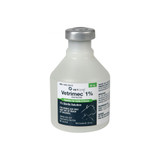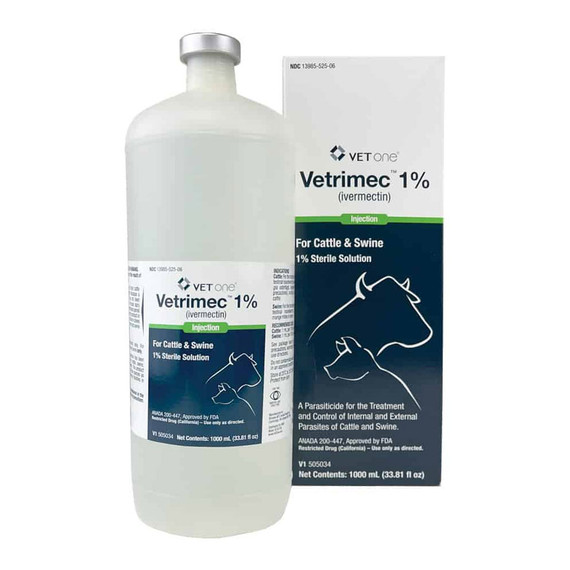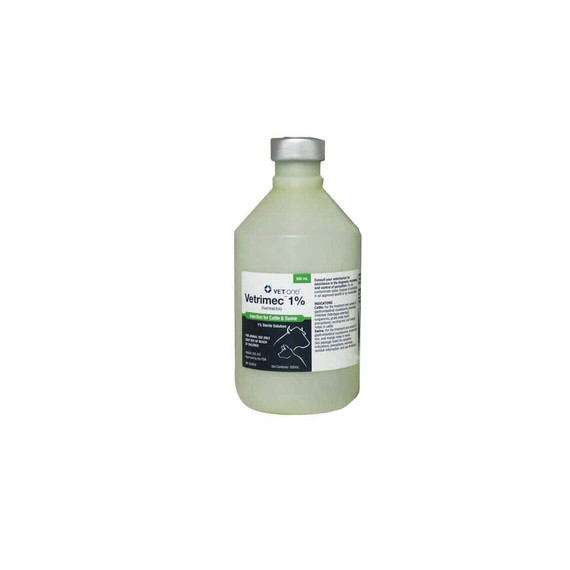-
Description
Description
Vetrimec 1% (ivermectin) is an injectable parasiticide for cattle and swine that offers convenience, broad-spectrum efficacy and safety. One low-volume dose effectively treats and controls the following internal and external parasites that may impair the health of cattle and swine: gastrointestinal roundworms (including inhibited Ostertagia ostertagi in cattle), lungworms, grubs, sucking lice, and mange mites of cattle; and gastrointestinal roundworms, lungworms, lice, and mange mites of swine.
Key Benefits
- Pour-on treatment for control of parasites in cattle
- Usage 1ml per 22lbs
- 40-550lb doses in 1000 ml
- Effective against roundworms, lungworms, grub, sucking lice, biting lice, mange mites, and horn flie
Indications
Cattle: Vetrimec 1% Injection is indicated for the effective treatment and control of the following harmful species of gastrointestinal roundworms, lungworms, grubs, sucking lice, and mange mites in cattle:
Gastrointestinal Roundworms (adults and fourth-stage larvae):
- Ostertagia ostertagi (including inhibited O. ostertagi)
- O. lyrata
- Haemonchus placei
- Trichostrongylus axei
- T. colubriformis
- Cooperia oncophora
- C. punctata
- C. pectinata
- Oesophagostomum radiatum
- Bunostomum phlebotomum
- Nematodirus helvetianus (adults only)
- N. spathiger (adults only)
Lungworms (adults and fourth-stage larvae):
- Dictyocaulus viviparus
Cattle Grubs (parasitic stages):
- Hypoderma bovis
- H. lineatum
Sucking Lice:
- Linognathus vituli
- Haematopinus eurysternus
- Solenopotes capillatus
Mites (scabies):
- Psoroptes ovis (syn. P. communis var. bovis)
- Sarcoptes scabiei var. bovis
Persistent Activity
Ivermectin Injection has been proved to effectively control infections and to protect cattle from reinfection with Dictyocaulus viviparus and Oesophagostomum radiatum for 28 days after treatment; Ostertagia ostertagi, Trichostrongylus axei and Cooperia punctata for 21 days after treatment; Haemonchus placei and Cooperia oncophora for 14 days after treatment.
Swine: Vetrimec 1% Injection is indicated for the effective treatment and control of the following harmful species of gastrointestinal roundworms, lungworms, lice, and mange mites in swine:
Gastrointestinal Roundworms:
- Large roundworm, Ascaris suum (adults and fourth-stage larvae)
- Red stomach worm, Hyostrongylus rubidus (adults and fourth-stage larvae)
- Nodular worm, Oesophagostomum spp. (adults and fourth-stage larvae)
- Threadworm, Strongyloides ransomi (adults)
Somatic Roundworm Larvae:
- Threadworm, Strongyloides ransomi (somatic larvae)
- Sows must be treated at least seven days before farrowing to prevent infection in piglets.
Lungworms:
- Metastrongylus spp. (adults)
Lice:
- Haematopinus suis
Mange Mites:
- Sarcoptes scabiei var. suis
-
Useful Info
Useful Info
Useful Info
Cattle: Vetrimec 1% Injection should be given only by subcutaneous injection under the loose skin in front of or behind the shoulder at the recommended dose level of 200 mcg of ivermectin per kilogram of body weight. Each mL of Vetrimec 1% Injection contains 10 mg of ivermectin, sufficient to treat 110 lb (50 kg) of body weight (maximum 10 mL per injection site).
Body Weight (lb) Dose Volume (mL) 220 2 330 3 440 4 550 5 60 6 770 7 880 8 990 9 1100 10 Swine: Vetrimec 1% Injection should be given only by subcutaneous injection in the neck of swine at the recommended dose level of 300 mcg of ivermectin per kilogram (2.2 lb) of body weight. Each mL of Vetrimec 1% Injection contains 10 mg of ivermectin, sufficient to treat 75 lb of body weight.
Body Weight (lb) Dose Volume (mL) Growing Pigs 19 1/4 38 1/2 75 1 150 2 Breeding Animal (Sows, Gilts, and Boars) 225 3 300 4 375 5 450 6 Administration:
Cattle: Vetrimec 1% Injection is to be given subcutaneously only, to reduce risk of potentially fatal clostridial infection of the injection site. Animals should be appropriately restrained to achieve the proper route of administration. Use of a 16-gauge, 1/2 to 3/4" needle is suggested. Inject under the loose skin in front of or behind the shoulder (see illustration).
When using the 50 mL, 500 mL or 1000 mL package size, use only automatic syringe equipment. Use sterile equipment and sanitize the injection site by applying a suitable disinfectant.
Clean, properly disinfected needles should be used to reduce the potential for injection site infections.
No special handling or protective clothing is necessary.
Swine: Vetrimec 1% (ivermectin) Injection is to be given subcutaneously in the neck. Animals should be appropriately restrained to achieve the proper route of administration. Use of a 16-or 18-gauge needle is suggested for sows and boars, while an 18-or 20-gauge needle may be appropriate for young animals. Inject under the skin, immediately behind the ear (see illustration).
When using the 50 mL, 500 mL or 1000 mL package size, use only automatic syringe equipment. As with any injection, sterile equipment should be used. The injection site should be cleaned and disinfected with alcohol before injection. The rubber stopper should also be disinfected with alcohol to prevent contamination of the contents. Mild and transient pain reactions may be seen in some swine following subcutaneous administration.
Recommended Treatment Program
Swine: At the time of initiating any parasite control program, it is important to treat all breeding animals in the herd. After the initial treatment, use Vetrimec 1% Injection regularly as follows:
Breeding Animals
Sows: Treat prior to farrowing, preferably 7-14 days before, to minimize infection of piglets.
Gilts: Treat 7-14 days prior to breeding.
Treat 7-14 days prior to farrowing.
Boars: Frequency and need for treatments are dependent upon exposure. Treat at least two times a year.
Feeder Pigs
(Weaners/Growers/Finishers)
All weaner/feeder pigs should be treated before placement in clean quarters.
Pigs exposed to contaminated soil or pasture may need retreatment if reinfection occurs.
Note:
- Vetrimec 1% Injection has a persistent drug level sufficient to control mite infestations throughout the egg to adult life cycle. However, since the ivermectin effect is not immediate, care must be taken to prevent reinfestation from exposure to untreated animals or contaminated facilities. Generally, pigs should not be moved to clean quarters or exposed to uninfested pigs for approximately one week after treatment. Sows should be treated at least one week before farrowing to minimize transfer of mites to newborn baby pigs.
- Louse eggs are unaffected by Vetrimec 1% Injection and may require up to three weeks to hatch. Louse infestations developing from hatching eggs may require retreatment.
- Consult a veterinarian for aid in the diagnosis and control of internal and external parasites of swine.
Special Minor Use
Reindeer: For the treatment and control of warbles (Oedemagena tarandi) in reindeer, inject 200 micrograms ivermectin per kilogram of body weight, subcutaneously. Follow use directions for cattle as described under Administration.
American Bison: For the treatment and control of grubs (Hypoderma bovis) in American bison, inject 200 micrograms ivermectin per kilogram of body weight, subcutaneously. Follow use directions for cattle as described under Administration.
Residue Warning:
Do not treat reindeer or American bison within 8 weeks (56 days) of slaughter.
Warning: Not for use in Humans.
Keep this and all drugs out of the reach of children.
The Safety Data Sheet (SDS) contains more detailed occupational safety information. To report adverse effects, obtain an SDS or for assistance, contact Bimeda, Inc. at 1-630-928-0361.
Residue Warning:
Do not treat cattle within 35 days of slaughter. Because a withdrawal time in milk has not been established, do not use in female dairy cattle of breeding age. A withdrawal period has not been established for this product in pre-ruminating calves. Do not use in calves to be processed for veal. Do not treat swine within 18 days of slaughter.
Precautions:
Transitory discomfort has been observed in some cattle following subcutaneous administration. A low incidence of soft tissue swelling at the injection site has been observed. These reactions have disappeared without treatment. For cattle, divide doses greater than 10 mL between two injection sites to reduce occasional discomfort or site reaction.
Use sterile equipment and sanitize the injection site by applying a suitable disinfectant. Clean, properly disinfected needles should be used to reduce the potential for injection site infections.
Observe cattle for injection site reactions. Reactions may be due to clostridial infection and should be aggressively treated with appropriate antibiotics. If injection site infections are suspected, consult your veterinarian.
This product is not for intravenous or intramuscular use.
Protect product from light.
Vetrimec 1% Injection for Cattle and Swine has been developed specifically for use in cattle, swine, reindeer, and American bison only. This product should not be used in other animal species as severe adverse reactions, including fatalities in dogs, may result.
Restricted Drug (California) - Use Only as Directed.
Storage:
Store at 20C to 25C (68F to 77F). Protect from light.
Vetrimec 1% (ivermectin) is an injectable parasiticide for cattle and swine that offers convenience, broad-spectrum efficacy and safety. One low-volume dose effectively treats and controls the following internal and external parasites that may impair the health of cattle and swine: gastrointestinal roundworms (including inhibited Ostertagia ostertagi in cattle), lungworms, grubs, sucking lice, and mange mites of cattle; and gastrointestinal roundworms, lungworms, lice, and mange mites of swine.
Key Benefits
- Pour-on treatment for control of parasites in cattle
- Usage 1ml per 22lbs
- 40-550lb doses in 1000 ml
- Effective against roundworms, lungworms, grub, sucking lice, biting lice, mange mites, and horn flie
Indications
Cattle: Vetrimec 1% Injection is indicated for the effective treatment and control of the following harmful species of gastrointestinal roundworms, lungworms, grubs, sucking lice, and mange mites in cattle:
Gastrointestinal Roundworms (adults and fourth-stage larvae):
- Ostertagia ostertagi (including inhibited O. ostertagi)
- O. lyrata
- Haemonchus placei
- Trichostrongylus axei
- T. colubriformis
- Cooperia oncophora
- C. punctata
- C. pectinata
- Oesophagostomum radiatum
- Bunostomum phlebotomum
- Nematodirus helvetianus (adults only)
- N. spathiger (adults only)
Lungworms (adults and fourth-stage larvae):
- Dictyocaulus viviparus
Cattle Grubs (parasitic stages):
- Hypoderma bovis
- H. lineatum
Sucking Lice:
- Linognathus vituli
- Haematopinus eurysternus
- Solenopotes capillatus
Mites (scabies):
- Psoroptes ovis (syn. P. communis var. bovis)
- Sarcoptes scabiei var. bovis
Persistent Activity
Ivermectin Injection has been proved to effectively control infections and to protect cattle from reinfection with Dictyocaulus viviparus and Oesophagostomum radiatum for 28 days after treatment; Ostertagia ostertagi, Trichostrongylus axei and Cooperia punctata for 21 days after treatment; Haemonchus placei and Cooperia oncophora for 14 days after treatment.
Swine: Vetrimec 1% Injection is indicated for the effective treatment and control of the following harmful species of gastrointestinal roundworms, lungworms, lice, and mange mites in swine:
Gastrointestinal Roundworms:
- Large roundworm, Ascaris suum (adults and fourth-stage larvae)
- Red stomach worm, Hyostrongylus rubidus (adults and fourth-stage larvae)
- Nodular worm, Oesophagostomum spp. (adults and fourth-stage larvae)
- Threadworm, Strongyloides ransomi (adults)
Somatic Roundworm Larvae:
- Threadworm, Strongyloides ransomi (somatic larvae)
- Sows must be treated at least seven days before farrowing to prevent infection in piglets.
Lungworms:
- Metastrongylus spp. (adults)
Lice:
- Haematopinus suis
Mange Mites:
- Sarcoptes scabiei var. suis
Useful Info
Cattle: Vetrimec 1% Injection should be given only by subcutaneous injection under the loose skin in front of or behind the shoulder at the recommended dose level of 200 mcg of ivermectin per kilogram of body weight. Each mL of Vetrimec 1% Injection contains 10 mg of ivermectin, sufficient to treat 110 lb (50 kg) of body weight (maximum 10 mL per injection site).
| Body Weight (lb) | Dose Volume (mL) |
|---|---|
| 220 | 2 |
| 330 | 3 |
| 440 | 4 |
| 550 | 5 |
| 60 | 6 |
| 770 | 7 |
| 880 | 8 |
| 990 | 9 |
| 1100 | 10 |
Swine: Vetrimec 1% Injection should be given only by subcutaneous injection in the neck of swine at the recommended dose level of 300 mcg of ivermectin per kilogram (2.2 lb) of body weight. Each mL of Vetrimec 1% Injection contains 10 mg of ivermectin, sufficient to treat 75 lb of body weight.
| Body Weight (lb) | Dose Volume (mL) | |
|---|---|---|
| Growing Pigs | 19 | 1/4 |
| 38 | 1/2 | |
| 75 | 1 | |
| 150 | 2 | |
| Breeding Animal (Sows, Gilts, and Boars) | 225 | 3 |
| 300 | 4 | |
| 375 | 5 | |
| 450 | 6 |
Administration:
Cattle: Vetrimec 1% Injection is to be given subcutaneously only, to reduce risk of potentially fatal clostridial infection of the injection site. Animals should be appropriately restrained to achieve the proper route of administration. Use of a 16-gauge, 1/2 to 3/4" needle is suggested. Inject under the loose skin in front of or behind the shoulder (see illustration).
When using the 50 mL, 500 mL or 1000 mL package size, use only automatic syringe equipment. Use sterile equipment and sanitize the injection site by applying a suitable disinfectant.
Clean, properly disinfected needles should be used to reduce the potential for injection site infections.
No special handling or protective clothing is necessary.
Swine: Vetrimec 1% (ivermectin) Injection is to be given subcutaneously in the neck. Animals should be appropriately restrained to achieve the proper route of administration. Use of a 16-or 18-gauge needle is suggested for sows and boars, while an 18-or 20-gauge needle may be appropriate for young animals. Inject under the skin, immediately behind the ear (see illustration).
When using the 50 mL, 500 mL or 1000 mL package size, use only automatic syringe equipment. As with any injection, sterile equipment should be used. The injection site should be cleaned and disinfected with alcohol before injection. The rubber stopper should also be disinfected with alcohol to prevent contamination of the contents. Mild and transient pain reactions may be seen in some swine following subcutaneous administration.
Recommended Treatment Program
Swine: At the time of initiating any parasite control program, it is important to treat all breeding animals in the herd. After the initial treatment, use Vetrimec 1% Injection regularly as follows:
Breeding Animals
Sows: Treat prior to farrowing, preferably 7-14 days before, to minimize infection of piglets.
Gilts: Treat 7-14 days prior to breeding.
Treat 7-14 days prior to farrowing.
Boars: Frequency and need for treatments are dependent upon exposure. Treat at least two times a year.
Feeder Pigs
(Weaners/Growers/Finishers)
All weaner/feeder pigs should be treated before placement in clean quarters.
Pigs exposed to contaminated soil or pasture may need retreatment if reinfection occurs.
Note:
- Vetrimec 1% Injection has a persistent drug level sufficient to control mite infestations throughout the egg to adult life cycle. However, since the ivermectin effect is not immediate, care must be taken to prevent reinfestation from exposure to untreated animals or contaminated facilities. Generally, pigs should not be moved to clean quarters or exposed to uninfested pigs for approximately one week after treatment. Sows should be treated at least one week before farrowing to minimize transfer of mites to newborn baby pigs.
- Louse eggs are unaffected by Vetrimec 1% Injection and may require up to three weeks to hatch. Louse infestations developing from hatching eggs may require retreatment.
- Consult a veterinarian for aid in the diagnosis and control of internal and external parasites of swine.
Special Minor Use
Reindeer: For the treatment and control of warbles (Oedemagena tarandi) in reindeer, inject 200 micrograms ivermectin per kilogram of body weight, subcutaneously. Follow use directions for cattle as described under Administration.
American Bison: For the treatment and control of grubs (Hypoderma bovis) in American bison, inject 200 micrograms ivermectin per kilogram of body weight, subcutaneously. Follow use directions for cattle as described under Administration.
Residue Warning:
Do not treat reindeer or American bison within 8 weeks (56 days) of slaughter.
Warning: Not for use in Humans.
Keep this and all drugs out of the reach of children.
The Safety Data Sheet (SDS) contains more detailed occupational safety information. To report adverse effects, obtain an SDS or for assistance, contact Bimeda, Inc. at 1-630-928-0361.
Residue Warning:
Do not treat cattle within 35 days of slaughter. Because a withdrawal time in milk has not been established, do not use in female dairy cattle of breeding age. A withdrawal period has not been established for this product in pre-ruminating calves. Do not use in calves to be processed for veal. Do not treat swine within 18 days of slaughter.
Precautions:
Transitory discomfort has been observed in some cattle following subcutaneous administration. A low incidence of soft tissue swelling at the injection site has been observed. These reactions have disappeared without treatment. For cattle, divide doses greater than 10 mL between two injection sites to reduce occasional discomfort or site reaction.
Use sterile equipment and sanitize the injection site by applying a suitable disinfectant. Clean, properly disinfected needles should be used to reduce the potential for injection site infections.
Observe cattle for injection site reactions. Reactions may be due to clostridial infection and should be aggressively treated with appropriate antibiotics. If injection site infections are suspected, consult your veterinarian.
This product is not for intravenous or intramuscular use.
Protect product from light.
Vetrimec 1% Injection for Cattle and Swine has been developed specifically for use in cattle, swine, reindeer, and American bison only. This product should not be used in other animal species as severe adverse reactions, including fatalities in dogs, may result.
Restricted Drug (California) - Use Only as Directed.
Storage:
Store at 20C to 25C (68F to 77F). Protect from light.





![Durvet for Cattle & Swine - Ivermectin Injection 1% Sterile Solution (50 ml) - [Parasite Treatment] Durvet for Cattle & Swine - Ivermectin Injection 1% Sterile Solution (50 ml) - [Parasite Treatment]](https://cdn11.bigcommerce.com/s-ransurezbm/images/stencil/570x633/products/1213/19514/501015__38925.1771906217.jpg?c=1)
![Durvet Ivermectin Injection 1% Sterile Solution for Cattle & Swine (500 mL) - [Parasite Treatment] Durvet Ivermectin Injection 1% Sterile Solution for Cattle & Swine (500 mL) - [Parasite Treatment]](https://cdn11.bigcommerce.com/s-ransurezbm/images/stencil/570x633/products/2593/20077/MWI094231__32079.1771906438.jpg?c=1)

